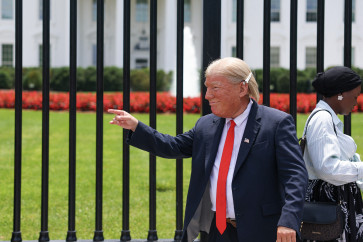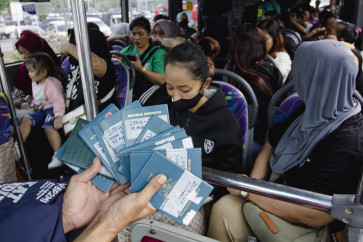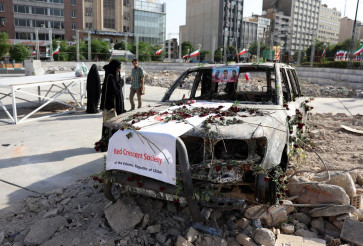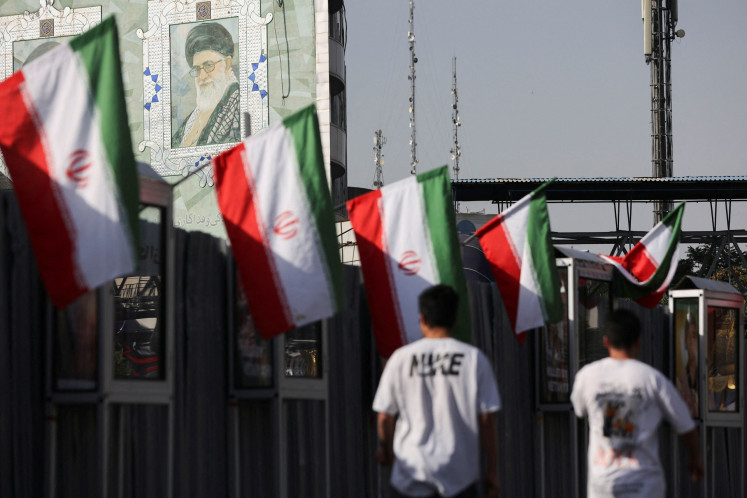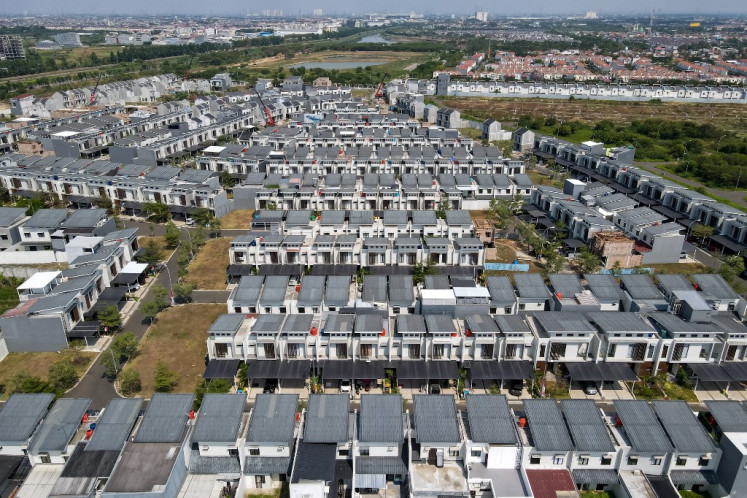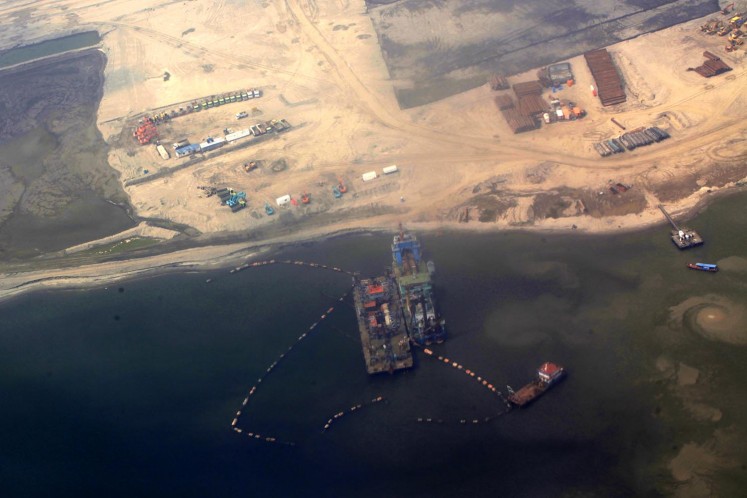Popular Reads
Top Results
Can't find what you're looking for?
View all search resultsPopular Reads
Top Results
Can't find what you're looking for?
View all search resultsHigh speed railway contract signed amid financing issues
Rail deal: The president director of Indonesian-Chinese joint venture PT Kereta Cepat Indonesia China (KCIC), Hanggoro Budi Wiryawan (second left), and executives of seven construction companies on Tuesday sign a US$4
Change text size
Gift Premium Articles
to Anyone

R
span class="caption">Rail deal: The president director of Indonesian-Chinese joint venture PT Kereta Cepat Indonesia China (KCIC), Hanggoro Budi Wiryawan (second left), and executives of seven construction companies on Tuesday sign a US$4.7 billion contract for the development of a high-speed railway connecting Jakarta and Bandung, West Java, as State-Owned Enterprises Ministry special staff member Sahala Lumban Gaol (back row, left to right), Presidential Chief of Staff (KSP) office head Teten Masduki, Chinese Ambassador to Indonesia Xie Feng, KCIC president commissioner Yang Zhong Min and state-owned construction firm Wijaya Karya (Wika) president director Bintang Perbowo look on. (JP/Farida Susanty)
The country’s long delayed construction of a high-speed railway, a flagship project between Indonesia and China, has eventually seen the US$4.7 billion contract officially signed despite a lack of clarity on financing issues.
The Indonesian-China consortium Kereta Cepat Indonesia China (KCIC) inked the engineering, procurement and construction (EPC) contract for the railway but at a higher value due to an adjustment to the detailed design. The initial estimate for the project was $4.3 billion.
“We hope that it can be a good starting point to finish construction on time with good quality,” KCIC president director Hanggoro Budi Wiryawan said on Tuesday.
KCIC established a consortium of seven companies called the High Speed Railway Contractor Consortium, including state construction firm PT Wijaya Karya (Wika) and China Railway International Co. Ltd. and Sinohydro Corporation Ltd.
Wika signed the contract with KCIC in late December, as it holds a 30 percent stake in the total construction value. The work includes soil investigation, road diversion, drainage and building stations, among other things.
However, he acknowledged that the company had yet to secure financing from the China Development Bank (CDB), which is slated to cover 75 percent of the total cost, which he said was still calculated.
To proceed with the project, KCIC agreed with the contractors to implement a contractor pre-financing (CPF) scheme, under which the contractors pay first for the construction cost as it could take months before the loan agreement with CDB was secured.
According to reports, CDB had initially sought to compel KCIC to procure 100 percent of the required land before the bank inked the loan agreement. “We are still negotiating [about the required land by CDB],” Hanggoro said, adding that the firm aimed to finish all of those administrative issues within two weeks.
Another requirement from CDB also included the national spatial plan (RTRW) as part of the factors that had hampered land procurement.
Presidential Chief of Staff (KSP) office head Teten Masduki stated that the signing should be a starting point for the construction. “It should assure us that the construction will be on schedule,” he said.
The railway, with an estimated cost of $5.2 billion, has not seen significant development since the government issued the construction permit for the 142.3 kilometer track connecting Jakarta and Bandung, West Java, in July last year.
It will connect four cities between Jakarta and Bandung, namely Halim, Karawang, Walini and Tegalluar. The government has given KCIC a fixed concession period of 50 years starting on May 31, 2019, which means that the construction must be completed by then.
“We hope that we can finish on time […] We ask the contractors to work all out for three shifts, as well as adding more manpower and tools,” Hanggoro said.
The project itself is one of the national strategic projects included in Presidential Regulation No. 3/2016, which stipulates that the government and related agencies must aid permit issuance for the listed projects.
The project has also been facing challenges regarding land procurement, which was previously cited by the Transportation Ministry as the next challenge after the construction permit was issued. KCIC has until December 2017 to secure 600 hectares of land needed for the project.
Hanggoro refused to reveal the latest progress in land procurement. In October last year, he revealed that it had reached around 82 percent. KCIC stated that it relied on the consortium’s equity for financing land procurement.
Responding to the signing, Chinese Ambassador to Indonesia Xie Feng stated that it was symbolic milestone for the project. “I hope there will be more cooperation between China and Indonesia,” he said.

